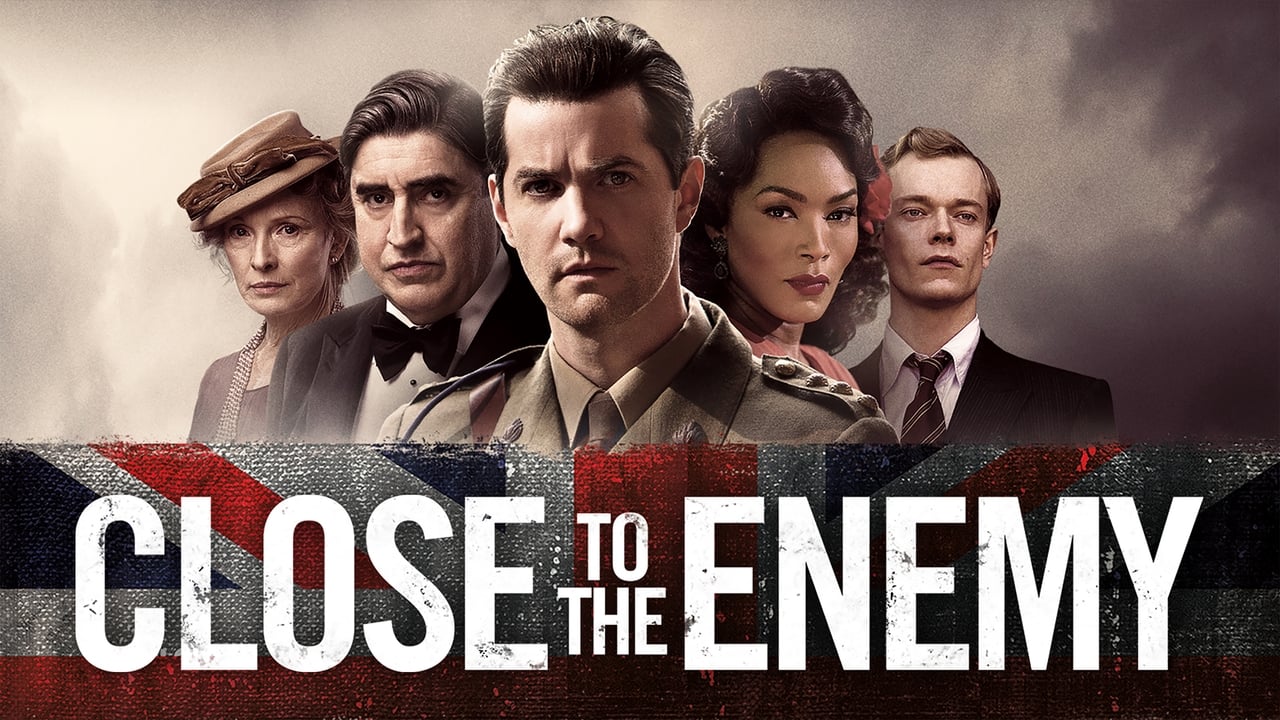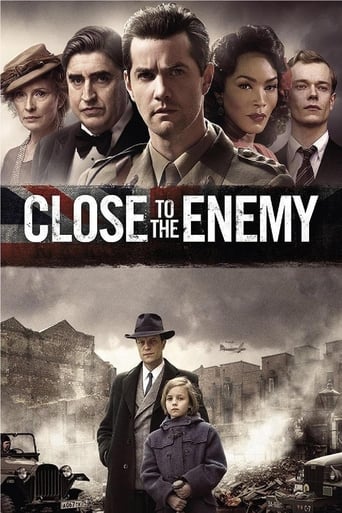

Binge watching this series on Acorn. Thoroughly enjoying the story. It takes its time to develop the various plots, and we are wondering who will be agents for the Americans and Soviets. While on the surface this story is about finding and keeping the Nazi scientists. It is really about the decline of the British Empire. The complex ornate hotel with its damaged and dark corners, the weary inhabitants, each adrift in their own way. It reminds me of the ocean liner - floating through purgatory. The British empire at this point is badly damaged, and tatty, its glory days behind, and it clearly sees that it has fallen behind the US and USSR. Yes, there are stereotypical characters, but each represents a different aspect of society. Even the Jazz singers represent a coming reckoning with race in society. The War Crimes investigator represents the conscious of society in the plot line during this particularly questionable moment in the post war era. Cal represents the military complex, conflicted but understanding the need to do the worst to prevent worse. I find Cal an interesting character - he is suffering from PTSD like his brother, he just has more control over the symptoms. The dare devil attitude, pushing boundaries of authority, the violence, the ADD, and maintaining a distance from people who can see him his pain. Cal also understands that he is stepping over the lines of morality when it comes to snatching the German engineer and his daughter. The sets are spectacular - shooting in some amazing and never seen locations in England. (Never seen by this American.) I went hunting to find out where they are. Beautiful and haunting. Again I go back to the sets representing the death of the Empire, the death of the prior way of life, a type of haunted purgatory for the inhabitants. Outside the faded glory of the hotel is a smoking wasteland of war, a barrier to the outside world.My one criticism is the way the party guests greet the jazz music - with disdain and dislike. Jazz was very popular in London in the 20's and 30's, particularly with the youth. Most of the people at that party would have been of an age to go to the jazz clubs before the war. I suspect the party guests represent the old, stiff England, while the Americans represent the future.
... View MoreTo say that the mind borders on stupification while trying to comprehend this dirge is an understatement. I can truly say that I do not think I have ever seen such a silly predictable almost comic stream of vignettes stitched together to form what to all intents is a farce. To steal a comment that Churchill allegedly made during his private viewing of Citizen Kane - "Rubbish, Rubbish, Bloody Rubbish.". I can't put my finger on it, but it is very much like a comic book version of Grand Budapest Hotel where all the characters are surreal and have costumes that are meant to define their character type rather than relying on any form of character development or dialogue. You end up having absolutely no interest in the characters, they just stroll in make a few comments and then disappear. So if you think this is about the development of the jet engine after the war then you are in for a surprise - it is not.How did one of my favourite actors, Jim Sturgess get involved in this truly bizarre film? I don't know but I urge you to watch it to see if you can contain your laughter.
... View MoreStephen Poliakoff has written and directed another masterpiece of a TV series, set in the immediate aftermath of World War II. I am however horrified at the torrent of abuse which this series has received from many sides. Is it possible that audiences are losing the ability to appreciate drama which lasts longer than a soundbite and requires a bit of thought? Or is some of the opposition to the series politically motivated? In this series, Poliakoff deals with his most important subject matter yet. I don't know about the 1938 Foreign Office meeting which figures so prominently in the story, as it may be fictional, but other than that, all the issues in this series are absolutely accurate. It was high time somebody tried to deal with these matters in dramatic form. In his series before last, GLORIOUS 39 (2009, see my review), Poliakoff dealt with the pro-Nazi sentiments of the British Establishment just before the War. Now he has carried those concerns further, by exploring the monstrous events which followed the War, regarding 'the ones who got away' or, more to the point, were allowed to get away with it. By 'it' I mean war crimes, torture, murder, genocide, and all the rest. Although this series deals with the much smaller compass of Britain, the really bad things which happened were in America, where everything was on a gigantic scale. One day, perhaps someone will dramatize that. From 1943 onwards, the 'smart Nazis' were preparing to flee Germany, and most of them later did so. The organiser of all this was Martin Bormann, Hitler's Secretary and manipulator. The organisation he set up was called the Brotherhood (Kameradenwerk), and the ODESSA organisation for fleeing Nazis was only a small part of it. I urge all interested persons to read the fundamental book which is necessary to understand what really happened, namely the meticulously researched book by one of America's leading investigative reporters, William Stevenson, entitled THE BORMANN BROTHERHOOD (1973). It provides the necessary background briefing for anyone who worries about the survival of genuine Nazism to this day, as what has now come to be called The Nazi International. In summary, what happened is this: Germany lost the war, but the Nazis did not. They merely spread and metastasized, no longer requiring their original host body, but finding new places to come to rest, such as Argentina, Chile, Bolivia, Paraguay, Mexico, Sweden (which was never de-Nazified, for which see the books of Stieg Larsson and the films of them), Switzerland, Spain (the headquarters of ODESSSA was in Madrid under Franco), Syria, Egypt (President Anwar Sadat had been a Gestapo agent during the War). The total wealth smuggled out of the Third Reich before the surrender of Germany was worth a few trillion dollars in today's money. Most of the gold of Europe 'disappeared', many ingots being smuggled out in I. G. Farben's tanks of poisonous chemicals. (Gold cannot be destroyed by any chemicals, and customs agents do not open poisonous chemical tanks.) With these funds a Fourth Reich was to be created in the future. Poliakoff has clearly been doing his research for years. He wants to alert the public in the only way possible in a controlled-media world, by means of drama which pretends to be fiction, and superficially is fiction, as far as storyline characters go. All the investigators of war crimes of the Allied governments after the War were side-lined, denied funds, files, and access, exactly as shown in Poliakoff's series. It is all true. Wake up, everyone! We have few details of the operations of the Russians available to us, but we now know a very great deal indeed about the monstrous illegality and immorality of such notorious projects as the American Operation Paperclip and its sister operations, which brought thousands of SS officers guilty of mass murder to America to work as scientists. For instance, Werner von Braun had been a Major in the SS, and his boss Dornberger had been a Major General in the SS. And yet they and their SS chums ended up running the American space programme and creating America's intercontinental ballistic missile technology. (Dornberger, 1895-1980, is wrongly described on the internet as a harmless 'German artillery officer', and his SS status has been covered up.) Dornberger even ended up as Vice President of the Bell Aircraft Corporation. Poliakoff's series concentrates on a single German scientist captured by the British, who is wanted by Britain to create a jet engine by improving and completing Frank Whittle's abandoned one. It is later discovered that he had worked in the German rocket programme where slave labourers were executed on a daily basis, and is in fact a war criminal. But enough of history, let us turn to the series. The outstanding performance is by Alfred Molina, as a senior Foreign Office mandarin. Poliakoff has a peculiarly evocative and elegiac style, and Molina 'gets it', thus effectively taking the place of Michael Gambon as the character who provides the correct 'tone'. Lindsay Duncan, in her supporting role, does the same. That is probably because they are both old pros. The younger members of the cast struggle initially, but finally get into groove and 'find the tone'. Poliakoff's magic comes from this 'tone', which always involves the elevating of memory into a numinous realm, where he attempts to touch some other world. Music is always important in a Poliakoff creation, and it is interesting that scent comes into this one as well, via Lindsay Duncan. (He'll be showering his actors with madeleines next!) Poliakoff charmingly has a child as a main character, played brilliantly by the young Lucy Ward, who speaks with her eyes. There are so many fine performances. Freddie Highmore is genuinely inspired as Victor Ferguson, the autistic brother of the hero, who is played in a droll and head-slanting manner by Jim Sturgess. This series is truly magnificent.
... View MoreHaving sat through all seven episodes in the hope that something would make sense or I would understand the point of the whole farrago, I remained disappointed.In the final episode, it is true, the tension was screwed up during the wedding - was Callum going to object during the ceremony or speak out during the best man's speech? It was a bit like the Duke of York leading his men - nothing happened, he just went on looking grim and murderous and why Rachel found him so attractive, I don't know. Then, suddenly, in the prosaic surroundings of a chicken run, Harold does the deed, before swanning off to a sunny retirement in France. So that was that then, and building a snowman healed all the hurts and solved all the problems at this very problematic hotel? Not being quite old enough to remember 1946, I can't say how realistic the environment was - it certainly wasn't sooty enough - and the old vehicles all looked too clean but, even given the rigours of war, there were just too many strange, pointless and plot-less elements to the story. If the point being made was that war isn't great and that people end up damaged, then OK, but it didn't need seven hours to do it.Maybe giving the author lots of money and then letting him direct it as well was not a great move - I am sure Hollywood can vouch for that!
... View More